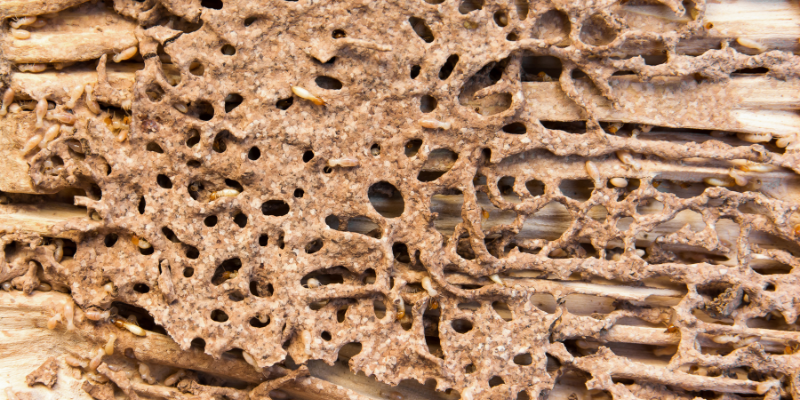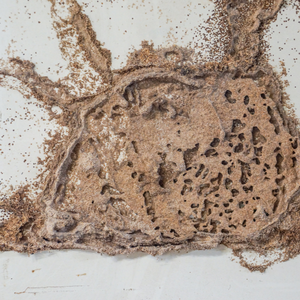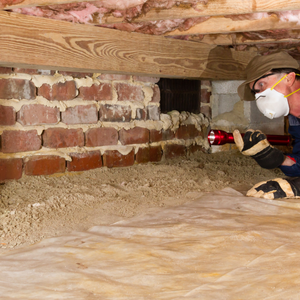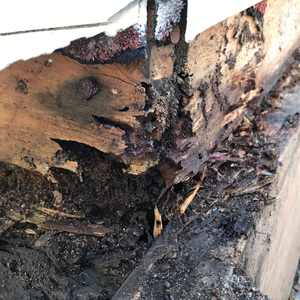
Termites show up in Washington homes all the time. It’s basically a termite kingdom around here. The rain, the dampness, and the wood everywhere contribute to this issue.
Selling a house with termite damage isn’t the problem you think it is. Buyers in Washington already know termites exist, and they’re way more interested in how you handled the problem than the fact that it happened. You just need to be straight with them and price things right — and Sell My House Fast For Cash can help you navigate the process for a faster, stress-free sale.
Here’s exactly how to sell your house with termite damage in Washington.
Can You Sell a House with Termite Damage in Washington?
Yes, you can sell a house with termite damage in Washington. Thousands of Washington homeowners sell houses with termite damage every year, and the market doesn’t stop just because some bugs ate part of your floor joists.
You need to disclose the termite history because that’s the law in Washington. But once you’re honest about it, selling is a lot easier. Get a recent inspection report, show your treatment records, and prove you fixed the damage with licensed contractors.
Buyers want to know you took care of business, not that you have a perfect house. They know perfect houses don’t really exist in the Pacific Northwest anyway. If you’d rather skip repairs and inspections, you can sell your home for cash in Lakewood or nearby cities and move on quickly without the stress.
Types of Termites Common in Washington State
Washington deals with two main termite species. Knowing which one invaded your home will help you understand what buyers will ask about.
Subterranean Termites
These are your main headaches in Washington. Subterranean termites live underground and build those weird pencil-thin mud tubes up your foundation walls to reach the wood in your house. You’ll spot them in crawl spaces, along basement beams, and anywhere moisture collects.
They’re incredibly common throughout King County, Snohomish County, and Pierce County because they absolutely love damp conditions. These termites go after support beams, floor joists, and any wood that’s touching soil, and they can cause serious structural damage within just a few years if left alone.
Treatment usually involves creating chemical barriers in the soil around your foundation. Because this type is so common in Washington, most buyers already expect it and aren’t too alarmed by a properly documented treatment history.
Dampwood Termites

Dampwood termites prefer moist, decaying wood and don’t even need contact with soil to survive. They move directly into lumber that’s already wet from leaks, poor drainage, or just sitting in humid conditions for too long. Homes near wooded areas in Everett, Arlington, and Snohomish see these guys more often, and they target window frames, deck posts, and any wood that’s been exposed to water damage.
The tricky part with damp wood termites is that they signal underlying moisture problems to buyers, which makes them more nervous than subterranean termites. You’ll need to show proof that you fixed both the termite infestation and whatever water issue attracted them in the first place.
Otherwise, buyers will worry about what else might be lurking behind your walls.
Signs of Termite Infestation in Your Home
Termites don’t announce themselves loudly. They’re sneaky little destroyers that work behind the scenes. By the time you notice them, they’ve usually been munching away for a while. Here’s what to look for:
- Mud tubes along foundation walls or beams: These pencil-width tunnels are how subterranean termites travel from soil to wood. If you see these in your crawl space or basement, you’ve got active termites right now.
- Hollow-sounding wood: Tap on baseboards, door frames, or support beams. If they sound empty or feel soft and squishy, termites have been eating from the inside out.
- Tiny piles of sawdust or what looks like coffee grounds: That’s termite droppings. Drywood termites leave these little pellet piles near the wood they’re destroying.
- Bubbling or peeling paint: Termites bring moisture into wood as they chew through it, which makes paint bubble up like there’s water damage.
- Bouncy floors or doors and windows that suddenly stick: Termites warp wood as they damage it, throwing everything out of alignment.
- Piles of translucent wings near windows or light fixtures: This means termites swarmed recently and started a new colony somewhere in or near your house.
Washington State Disclosure or Termite History
Washington is very serious about disclosure laws. You have to tell buyers about termite damage and there’s no way around it.
The state requires you to fill out a Seller Disclosure Statement (Form 17) and it specifically asks about pest infestations, structural damage, and anything that could affect your property’s value.
Termite history counts as a material fact even if you treated it years ago. If you hide termite damage and buyers find out after closing, you’re looking at lawsuits, financial penalties, or having the entire sale reversed.
Full transparency actually builds trust with buyers. When you hand over inspection reports and treatment records without being asked, buyers see you as responsible instead of shady.
How to Sell a House with Termite Damage in Washington
Selling a house with termite damage needs strategic timing, transparency, and correct pricing. Here are the exact seven steps to guide you!
Step 1: Get a Professional Termite Inspection
Schedule a termite inspection before you even think about listing your house. A recent clean report from a licensed inspector is worth its weight in gold when buyers start asking questions.
This inspection will show the current state of your home and prove you’re not hiding anything. If the inspector finds active termites, you’ll know about it before buyers do, which gives you control over how to handle it.
Inspections in Washington typically cost between $75 and $150 and they’re valid for about 30 to 90 days. Get one done within that window of listing so it’s fresh and credible.
Step 2: Decide Whether to Repair or Sell As-Is
This is your big decision point. If the damage is minor and you’ve got the cash, fixing it before listing usually gets you a higher sale price. You’ll appeal to traditional buyers who want move-in-ready homes and you’ll have less negotiation drama.
But if the termite damage is extensive or you don’t have repair money sitting around, selling as-is to a cash buyer makes way more sense. You skip the repair headaches, close faster, and move on with your life.
Think about your timeline, your budget, and how bad the damage actually is. That tells you which path to take.
Step 3: Gather All Documentation and Treatment Records
Buyers want proof you handled things professionally. Find every piece of paper related to your termite problem. This includes:
- original inspection reports
- pest control contracts
- treatment invoices
- structural repair receipts
- follow-up inspection reports
- any warranties you got from the pest control company
- permits pulled for structural repairs
Organize everything into a folder you can hand to buyers or their agents immediately.
Step 4: Disclose Termite History to Potential Buyers
Don’t wait for buyers to ask. Disclose your termite history upfront in your listing materials and in Form 17. Be specific about when the infestation happened, what areas were affected, what treatment you used, and what repairs you made. Buyers appreciate honesty way more than they appreciate discovering surprises during their own inspection.
When you’re transparent from the start, you filter out buyers who can’t handle any pest history. You also attract the ones who are cool with it as long as it’s been handled properly.
Step 5: Price Your Home Competitively

Homes with termite history typically sell for less than comparable homes without it. That’s just reality. Research recent sales of similar homes in your area, especially ones with disclosed pest issues, if you can find them.
Work with a real estate agent who knows your local market and can run a comparative market analysis. Price your home slightly below comparable homes without termite history, but don’t drastically underprice it either.
You can always negotiate down, but you can’t negotiate up once you’ve listed too low.
Step 6: Market Your House Effectively
Frame your termite history as a solved problem, not a current disaster. Use phrases like “professionally treated and certified termite-free” or “comprehensive pest control with transferable warranty” in your listing description.
Make that recent clean inspection report a hero document in your marketing materials. Highlight the quality of your repairs. If you used licensed contractors and pulled permits, say so.
Also, create a pest management folder with all your documentation that you can share immediately when buyers express interest. The goal is to show buyers you’re organized and totally on top of this issue.
Step 7: Negotiate and Close the Sale
Buyers will probably try to negotiate based on your termite history. Expect requests for price reductions, repair credits, or asking you to cover their first year of termite inspections. Be ready to compromise on some things, but know your bottom line before negotiations start.
If you’ve documented everything properly and priced competitively, you’re in a strong position. Stick to the facts: the termites are gone, the damage is fixed, and you’ve got proof.
Once you agree on the terms, closing should be smooth. Well, as long as your paperwork is in order and you haven’t hidden anything that could pop up during the buyer’s inspection.
Cost of Termite Inspections in Washington
Termite inspections in Washington run between $75 and $150, depending on your home’s size and location. Seattle and Bellevue inspections tend to hit the higher end of that range, while smaller towns like Arlington or Enumclaw stay closer to $75.
The inspection takes about an hour, and the inspector checks your crawl space, basement, attic, and anywhere else termites like to hang out. You’ll get a written report within a few days that tells you whether termites are active, whether there’s old damage, and what you need to do about it. If the results aren’t what you hoped for, you can always sell your home for cash in Tacoma or nearby cities and avoid the hassle of extensive repairs.
Treatment and Repair Options for Termite Damage
Once you know you’ve got termites, you need to kill them and fix whatever they destroyed. The costs vary depending on how bad things are and which type of termites threw the party in your house.
Professional Termite Treatment Costs
Termite treatment in Washington ranges from $230 to $930 for basic cases, with most homeowners paying around $575. If you’ve got a serious infestation that requires tenting and fumigating your entire house, you’re looking at closer to $2,500 or even higher.
Subterranean termite treatment usually involves creating liquid chemical barriers in the soil around your foundation, which runs between $1,200 and $3,000 for most homes.
Repairing Structural Damage from Termite Infestation
Structural repairs depend entirely on how much wood the termites ate through.
Minor damage might only need wood hardener and sealant, which costs a few hundred bucks. More serious damage means replacing entire beams, floor joists, or wall studs. That’s where costs jump to anywhere between $2,000 and $10,000 or more.
Transferable Warranties and Their Value to Potential Buyers
Termite treatment usually comes with a warranty that lasts between one and five years. These warranties can transfer to the new owner when you sell. This is huge for buyers because it means they’re protected if termites come back after closing.
You can also prepay for the buyer’s first year or two of annual termite inspections, which typically cost $75 to $150 per inspection.
Is It a Good Idea to Sell to a Cash Buyer?

Cash buyers specialize in buying homes that need work, and termite damage doesn’t scare them off one bit. They’re investors, house flippers, or companies that handle all the repairs themselves after closing.
Why cash buyers work for termite-damaged homes:
- Skip all termite repairs. They buy your house with the damage exactly as it sits right now.
- No extermination required. You don’t need to hire pest control companies or wait for treatment to finish.
- Fast closing timeline. Most cash sales close in two to eight weeks, some as quickly as seven days.
- No financing contingencies. Buyers won’t back out because their lender freaked out about your termite history.
- Minimal inspections. Cash buyers do their own quick assessment and move forward without demanding extensive pest reports.
- Zero repair negotiations. They factor termite damage into their offer upfront, so you’re not haggling over who pays for what.
Cash buyers typically offer below market value because they’re taking on your termite problems and need to make money when they resell. But if you’re short on cash for repairs or the damage is so extensive that fixing it doesn’t make financial sense, selling to a cash buyer gets you to closing without the stress.
Key Takeaways: Selling a House with Termite Damage in Washington
Termite damage doesn’t have to derail your home sale in Washington. The law requires full disclosure, but buyers around here already expect pest issues in older homes or properties near wooded areas. Whether you choose to repair and list traditionally or skip repairs and sell as-is, both paths can get you to closing.
If termite repairs feel like more than you can handle right now, selling to a cash buyer removes all that headache. Sell My House Fast For Cash buys houses throughout Washington in any condition, with termite damage and all. Contact us at (866) 824-3222 for a no-obligation cash offer and move on with your life without spending another dollar on pest control.
Helpful Washington Blog Articles
- Refinance A House After Divorce in Washington
- How to Sell a Condemned House in Washington
- Can the Seller Back Out of a Contract?
- Selling a House with Termite Damage in Washington
- Sell a House with a Code Violation in Washington
- Understanding FSBO Costs in Washington
- How to Sell a Hoarder House in Washington
- How Long After an Appraisal Can You Close in Washington?

